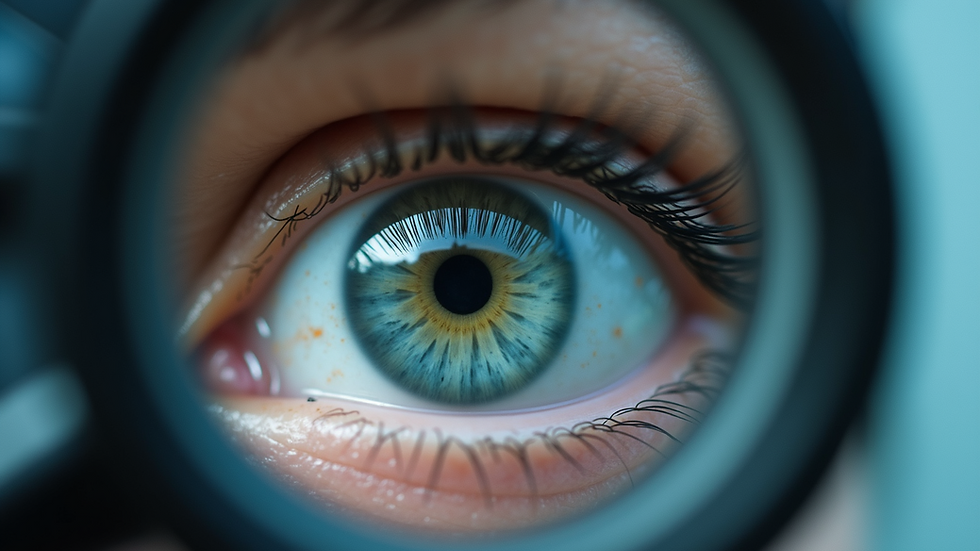Understanding and Managing Double Vision Causes
- Anubhav Gupta
- Jul 28, 2025
- 4 min read
Double vision, medically known as diplopia, can be a concerning and often confusing condition. It occurs when a person sees two images of one object, which can hinder daily activities significantly. Understanding the causes behind this vision issue is essential for effective management and treatment. This blog delves into the multifaceted aspects of double vision, aiming to equip readers with actionable insights to navigate this challenging condition.
Causes of Vision Issues
Several underlying factors can contribute to vision problems, including double vision. These causes can vary widely from temporary conditions to more serious health issues. Common causes include:
Refractive Errors: This is when the shape of the eye prevents light from focusing directly on the retina. Conditions like myopia, hyperopia, and astigmatism may lead to double vision.
Eye Muscle Problems: The muscles that control eye movement may weaken or become imbalanced, resulting in blurred or double images. Conditions such as strabismus (crossed eyes) are prime examples.

Neurological Disorders: Disorders impacting the brain, like multiple sclerosis or strokes, can interfere with the brain's ability to process visual information, causing double vision.
Cataracts: The clouding of the eye's natural lens can lead to multiple images or a blurred vision scenario, further contributing to the double vision experience.
Diabetes Complications: Diabetic patients may experience changes in their vision due to diabetic retinopathy and other complications associated with this condition.
Certain lifestyle factors, such as prolonged computer use, can exacerbate existing vision issues, further complicating an already challenging situation.
What Are the Symptoms of Double Vision?
Recognizing the symptoms of double vision is crucial for prompt diagnosis and treatment. Aside from seeing two images of a single object, individuals may experience:
Blurred Vision: The images might not just be split; they may also appear unclear or fuzzy.
Difficulty Focusing: A person might struggle to maintain focus on an object, leading to frustration during tasks like reading or driving.
Headaches or Eye Strain: Prolonged effort to see clearly can result in discomfort, headaches, or strain around the eyes.
Nausea: In some cases, double vision can cause dizziness or nausea as the brain struggles to reconcile conflicting visual input.
These symptoms can significantly impact quality of life, making it essential to pursue help if they manifest.
What Suddenly Causes Double Vision?
Sudden onset double vision can be alarming. It may signal an underlying health crisis that needs immediate attention. Some potential sudden causes include:
Stroke: This is a critical medical emergency. Sudden double vision, alongside other symptoms like weakness on one side or difficulty speaking, should prompt immediate medical intervention.
Head Injury: Trauma to the head can impact the muscles controlling eye movement or the brain regions related to vision.
Diabetic Emergencies: A sudden increase or decrease in blood sugar levels can lead to rapid changes in vision, including double vision.
Inflammation: Conditions such as thyroid eye disease can lead to swelling of the eye muscles, causing sudden double vision.

If sudden double vision occurs, it is vital to consult a healthcare professional promptly to determine the underlying cause and receive appropriate treatment.
Diagnosis and Treatment of Double Vision
Diagnosing double vision requires thorough evaluation by an eye care specialist. Various tests may be conducted, including:
Comprehensive Eye Examination: Tests to check the health of the eyes, including vision tests and muscle function assessments.
Neurological Evaluation: A thorough assessment may be necessary if a neurological cause is suspected.
Blood Tests: To check for underlying conditions such as diabetes or thyroid issues that might be impacting vision.
Once diagnosed, treatment will depend on the underlying cause and may include:
Corrective Lenses: Prescription glasses may be suggested to correct refractive errors leading to double vision.
Eye Exercises: Certain exercises can help strengthen eye muscles and improve coordination, especially in cases of strabismus.
Medication: For underlying conditions like diabetes or inflammation, medication may be required to address those health issues.
Surgery: In some cases, surgery may be necessary to realign eye muscles or remove cataracts that are causing double vision.

Lifestyle Changes for Managing Vision Health
In addition to medical treatment, lifestyle changes can significantly impact vision health and help manage double vision effectively:
Limit Screen Time: Extended periods of screen use can strain the eyes. Taking frequent breaks can alleviate discomfort. Implement the 20-20-20 rule: every 20 minutes, look at something 20 feet away for 20 seconds.
Healthy Diet: Nutritional choices playing a crucial role in overall eye health. Including antioxidants like vitamins C and E, omega-3 fatty acids, and leafy greens can promote better vision.
Stay Hydrated: Adequate water intake is essential for maintaining optimal eye function. Dry eyes can exacerbate vision problems.
Regular Eye Check-ups: Frequent visits to an eye care professional can help catch potential problems early and allow for timely intervention.
Reduce Stress: Stress can contribute to various health issues, including those related to vision. Practicing relaxation techniques, such as yoga or meditation, can promote overall well-being.
Understanding the importance of addressing double vision causes can facilitate better health choices and timelier medical intervention. If you're experiencing double vision, don't hesitate to reach out to a professional who can help diagnose and treat the issue. For further information on the double vision causes and related eye health topics, continuing education is key.
A Path Toward Better Vision
Double vision can be frustrating, but with the right knowledge, diagnosis, and treatment, individuals can reclaim their visual clarity and quality of life. Stay informed, proactively manage your visual health, and seek professional care when needed. Good vision is a vital aspect of overall health and well-being.




Comments